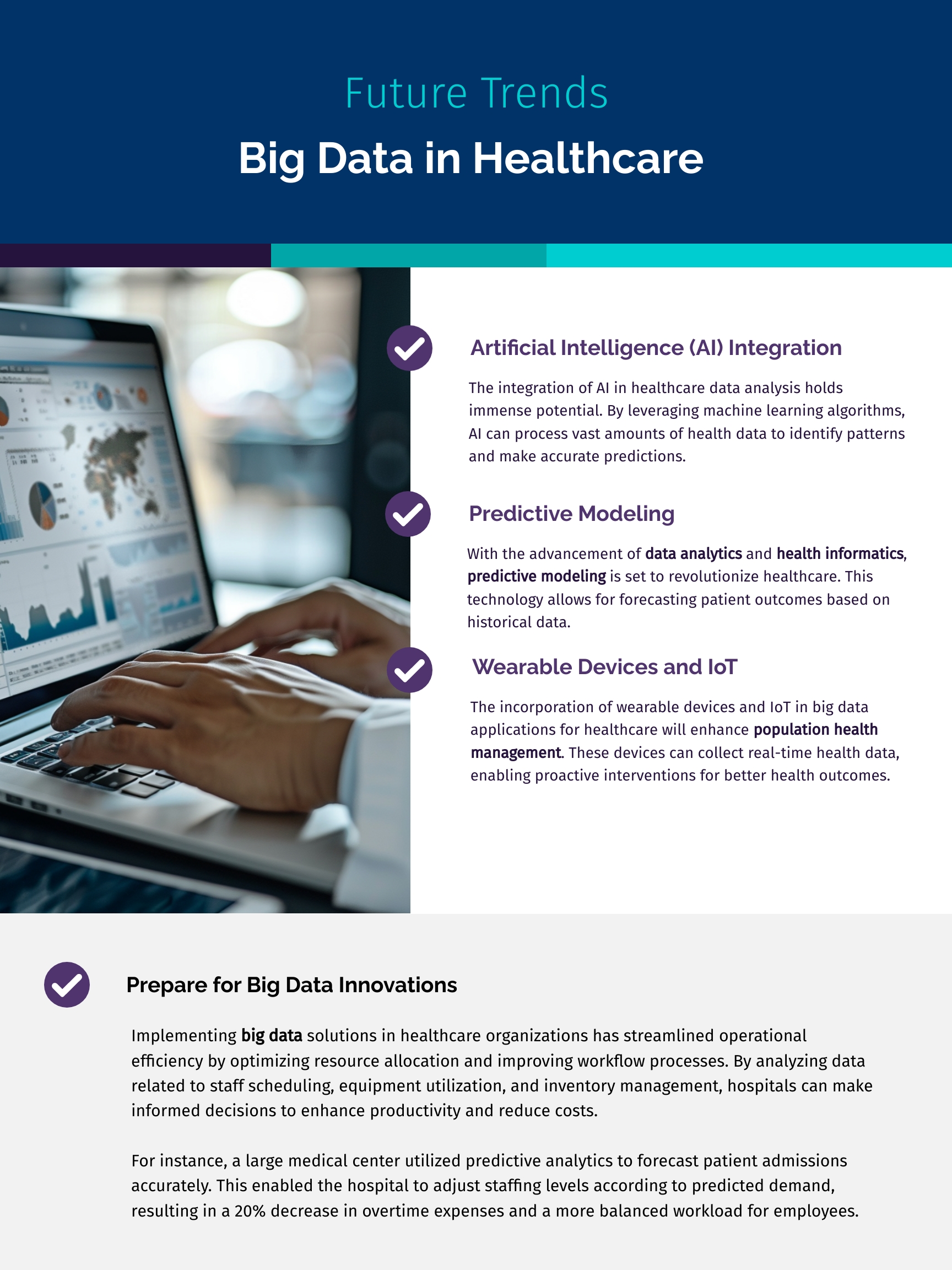
22 May BIG Data Analytics: Unlocking Insights in Health Care
Book a Demo Today
Table of Contents
The impact of big data is undeniable. Harnessing vast amounts of information has revolutionized how medical decisions are made and treatments are tailored to individual needs. Big data analytics not only enhances patient outcomes but also streamlines operations for healthcare providers, insurance companies and law firms. By delving into historical data, trends, and patterns, you can unlock valuable insights that drive advancements in medical research and personalized case management.
Role of Big Data in Healthcare
Big data in healthcare refers to the vast amount of health data collected from various sources such as electronic health records, medical imaging, and wearable devices. This data is then analyzed to extract valuable insights for improving patient care.
Analyzing patient information using big data analytics can lead to significant advancements in healthcare. By examining trends and patterns in large datasets, healthcare providers can make more informed decisions regarding diagnosis, treatment plans, and preventive measures. This ultimately improves patient outcomes by enabling early detection of diseases, personalized treatment strategies, and better overall care.
The impact of big data on personalized medicine is profound. Through the analysis of diverse datasets including genetic information, lifestyle factors, and blood pressure readings, healthcare professionals can tailor treatments to individual patients’ specific needs. This approach ensures that treatments are more effective, leading to better results and higher patient satisfaction.
The Evolution of Record Keeping
Medical record keeping has evolved significantly over the years, transforming the way patient information is documented and managed. Initially, medical records were maintained in paper format, which was prone to errors and inefficiencies.
With the advent of technology, there has been a substantial shift towards electronic health records (EHRs). These digital systems enable healthcare providers to store and access patient data more efficiently, leading to improved coordination of care and better patient outcomes.
The transition from paper-based records to EHRs has revolutionized the healthcare industry by streamlining processes and enhancing data accuracy. Digitalizing medical records allows for seamless integration of historical data, facilitating comprehensive analysis for personalized patient care.
Benefits of Digital Records for Data Analysis
- Improved Accessibility: EHRs provide instant access to patient information, enabling healthcare professionals to make informed decisions quickly.
- Enhanced Data Security: Electronic records offer robust security measures to protect sensitive patient data from unauthorized access or breaches.
- Streamlined Workflow: Digitalized records minimize paperwork, reducing administrative burden and allowing more focus on patient care.
Big Data's Role in Record Retrieval
Big data helps doctors find patient info quickly by utilizing large data sets, healthcare providers can streamline the retrieval process, ensuring quick access to critical patient records.
Through data mining and data collection, big data enables the integration of disparate medical records systems, allowing for a comprehensive view of a patient’s health history. This integration enhances clinical decision-making by providing healthcare professionals with a holistic understanding of each patient’s needs.
- Improved accessibility to medical records
- Streamlined retrieval process
- Enhanced clinical decision support
- Comprehensive view of patient health history
Future Trends in Data and Healthcare

Copy this code to embed our Infographic:
<a href="https://americanretrieval.com/wp-content/uploads/2024/05/Big-Data-in-Healthcare-Research-Innovations.jpg"><img decoding="async" style="width:100%;" src="https://americanretrieval.com/wp-content/uploads/2024/05/Big-Data-in-Healthcare-Research-Innovations.jpg"></a><br>Embed Infographic<a href="https://americanretrieval.com/big-data-analytics">American Retrieval Company - Big Data Analytics</a>
Advantages of Data in Healthcare
Optimizing Disease Prevention and Early Detection: Big data enables healthcare providers to analyze vast amounts of patient data, identifying patterns that indicate potential health risks. By leveraging this information, you can proactively intervene in preventing diseases before they escalate.
Enhancing Resource Allocation with Predictive Analytics: Through predictive analytics, healthcare organizations can forecast patient needs and allocate resources efficiently. This means that you receive timely and personalized care based on your medical history and risk factors.
Improved disease prevention
Enhanced early detection capabilities
Personalized treatment plans
Cost-Saving Benefits in Operations: Utilizing big data helps streamline operations, reducing unnecessary costs and improving overall efficiency. By optimizing processes through data analysis, healthcare providers can deliver high-quality care at a lower cost.
Reduced operational expenses
Enhanced patient outcomes
Increased efficiency in healthcare delivery
Challenges in Harnessing Data
Privacy and security are key concerns when it comes to utilizing data analytics in healthcare. Sensitive information must be protected from unauthorized access and breaches.
Data integration and interoperability pose significant challenges due to the diverse sources of data in healthcare. Ensuring that different systems can communicate and share information seamlessly is critcal for effective data management.
The issue of data quality and accuracy is a critical aspect of big data analytics. Inaccurate or incomplete data can lead to faulty insights and decisions, impacting patient care and outcomes.
Big data has revolutionized healthcare, leading to significant advancements in patient care. Studies have shown that leveraging clinical data through big data analytics can greatly enhance patient outcomes. For example, researchers at a renowned hospital used big data to analyze treatment plans and make more informed decisions, resulting in improved efficiency and better results for patients.
Enhanced Research Capabilities
The integration of big data technologies in the healthcare sector has revolutionized research capabilities by providing researchers with access to extensive datasets for analysis. Researchers can now leverage advanced analytics tools to uncover new insights, identify disease trends, and develop innovative case management methods.

Legal and insurance professionals
Summary
In a world where data reigns supreme, the impact of big data on healthcare cannot be overstated. From revolutionizing medical record keeping to enhancing patient care and research, big data is reshaping the healthcare landscape. Despite its challenges, the advantages and success stories showcased in this article highlight the immense potential for big data to drive innovation and improve outcomes in the healthcare industry.
As you prepare for the upcoming wave of big data innovations in healthcare, remember to stay informed, adapt to new technologies, and embrace a data-driven mindset. By leveraging the power of big data responsibly and ethically, you can contribute to a future where personalized medicine, predictive analytics, and improved patient experiences are not just possibilities but realities.



